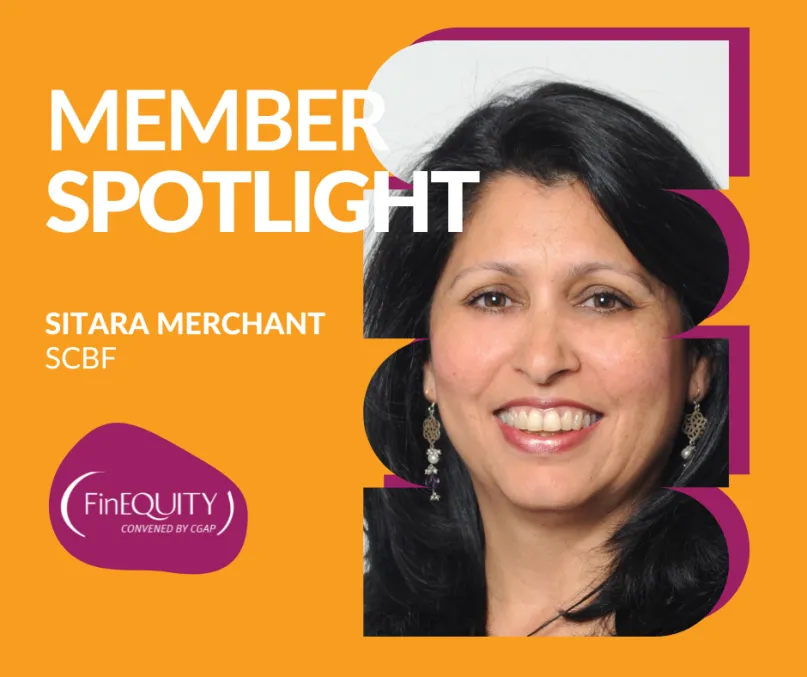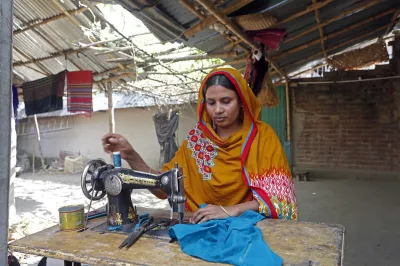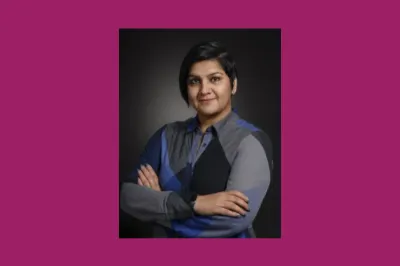Member Spotlight: Sitara Merchant

Sitara Merchant, CEO of the Swiss Capacity Building Facility (SCBF), sat down with us to discuss SCBF’s journey into the financial products space, the new SCBF strategy, and their emerging focus on impact-linked finance.
SCBF is an innovative public-private platform to enhance inclusive finance for low-income clients, especially women, smallholder farmers, and MSMEs, in emerging contexts. SCBF enables, with funding, financial service providers to access the expertise required to develop, tailor, and scale innovative solutions that address the unique challenges these populations face.
FinEquity: Can you tell us a little bit about yourself? A fun fact? Something that might surprise most people?
Merchant: I am of Indian origin, born in Tanzania and grew up in Kenya. I emigrated to the United States for university, emigrated again to Canada, and then finally to Switzerland. So, I consider myself a bit of a world citizen. I am super passionate about international development. A fun fact about me is that I am an avid swimmer.
FinEquity: How did you get involved in the financial inclusion space? What led you to the Swiss Capacity Building Facility (SCBF)?
Merchant: When I was working for the Aga Khan Development Network (AKDN), I was asked to take on a role with the Aga Khan Agency for Microfinance, providing technical assistance to our microfinance institutions to shift from supply side to client-centric financial products and services. This meant developing product development units within 13 microfinance institutions that could do market research and develop client-centric financial products. Getting these units up and running and successfully functioning was cool to see, and many of them still have them today. That is how I started working in this space.
In 2019, looking for a new adventure, I accepted the CEO role at SCBF. What is amazing about SCBF is the collaboration with our 30 members – we are a public-private platform. We leverage and blend public and private sector resources, both human and financial. We have a very strong portfolio of insurance, thanks to our members, having funded technical assistance to develop insurance products, including for health and property. The graphic below shows the outreach achieved through our 188 projects (from 2011 to 2021) and the types of financial products we have funded.
SCBF Outreach. Source: SCBF.
FinEquity: What is SCBF currently working on that makes you excited?
Merchant: We at SCBF are really excited about our new strategy. Our members approved the strategy at SCBF’s Annual General Assembly. The overall vision will remain the same, which is to improve the quality of life of low income and vulnerable households, smallholder farmers, and MSMEs, with a particular focus on women. Access to inclusive finance builds resilience and enables economic empowerment and access to essential services.
The main focus of the new strategy is for SCBF to expand its “financial instruments” (in addition to technical assistance grants) to address the needs of high-impact enterprises that need patient capital. These instruments are returnable grants, impact-linked loans, and grants. These are ‘pioneer gap’ enterprises – companies that are too large for seed funding, yet do not have the track record necessary to access commercial or impact investment. The pioneer gap is the moment when many social enterprises fail. Many of our grantees face this challenge – particularly the fintechs and insurtechs. These social enterprises in the pioneer gap lack three things: networks, capital, and technical expertise. So, we are really rounding off our product portfolio to be able to provide those elements.
I will tell you a story that brings this public-private platform to life from one of our projects. There is an insurtech social enterprise we worked with that provides index insurance to smallholder farmers in Mali working in the cotton and maize value chains. We were introduced to them by one of our members, Allianz, as an enterprise that is intentionally creating social impact but lacks financing to further develop their index insurance product. We had a call with them and invited them to submit an application, and the application was reviewed by a project committee composed of SCBF members. Instead of paying membership dues, our members volunteer their time and knowledge to review, approve, and later on to monitor the projects. So, we had people working in the insurance sector that reviewed this particular project.
We then had members that facilitated connections with the insurtech. The Swiss Agency for Development and Cooperation (SDC) connected them to the local government bodies responsible for inclusive insurance to overcome some of the regulatory hurdles they faced. Allianz also introduced them to farmer cooperatives so that they were able to grow their customer base. When they came to us, they had a client base of something in the range of 300-500. Today, they have at least 12,000 farmers in Mali and this number is growing. The enterprise has since expanded to other markets, in Uganda and Ivory Coast. This story really shows the whole process of our work and they are one of the organizations that said to us, look, we like the technical assistance funding, but we would also like other types of funding or capital available to us. And this is the new part of our strategy, which focuses on returnable grants and impact-linked finance.
In addition to what we do today, which is broader in terms of being non-sector specific, we are focusing in the new strategy on four sectors in particular: the nexus between health and finance, climate and finance, agricultural finance, and housing finance. And within these four sectors, we have three cross-cutting themes: gender, migrants and refugees, and low-income populations in general.

Synopsis of SCBF’s strategy. Source: SCBF.
FinEquity: Do you have a success story that you would like to share from SCBF’s work on women’s economic empowerment and financial inclusion?
Merchant: I think our biggest success story is really our outreach. Our grant funding has to date reached 3.4 million clients to support their access to tailored financial products and channels, of which 64% of these are women. For us this is a huge area of focus, and we continue to have that focus on women with the new strategy. Gender is a cross-cutting theme and we always look at how we ensure women are included in the projects we consider. With Women’s World Banking, we have done a lot of work on supporting hospital cash programmes and we have had a lot of success in West Africa with including women.
FinEquity: What role does FinEquity play in your work? Where do you see value in this community? Is there anything else you would like to share?
Merchant: Having access to the knowledge and insights that FinEquity shares has been really useful. We were on a call where FinEquity was encouraging more women in certain projects and we offered to fund projects that they would come up with. We have always worked very closely with both CGAP and FinEquity.
It is a super exciting time in the space that we have been playing in over the last seven years. Even though the Sustainable Development Goals (SDGs) did not have financial inclusion in them, people are realizing the value of access to finance. To give a simple example, we were talking to a potential donor and she said that we really have a corner on the market because, while from a health perspective they can try and reduce costs of clinics as far as they can, they can never get it to zero. And she acknowledged that what we are doing is really putting money into people’s hands to give them access to essential services like education and health care. We do have this expertise and we are looking for partners to join us in this journey, so we welcome donors, funders, and those interested in becoming SCBF members to reach out.


